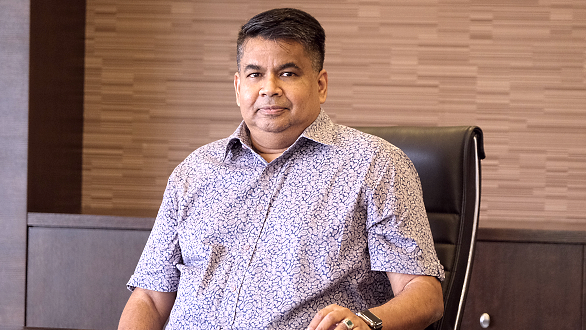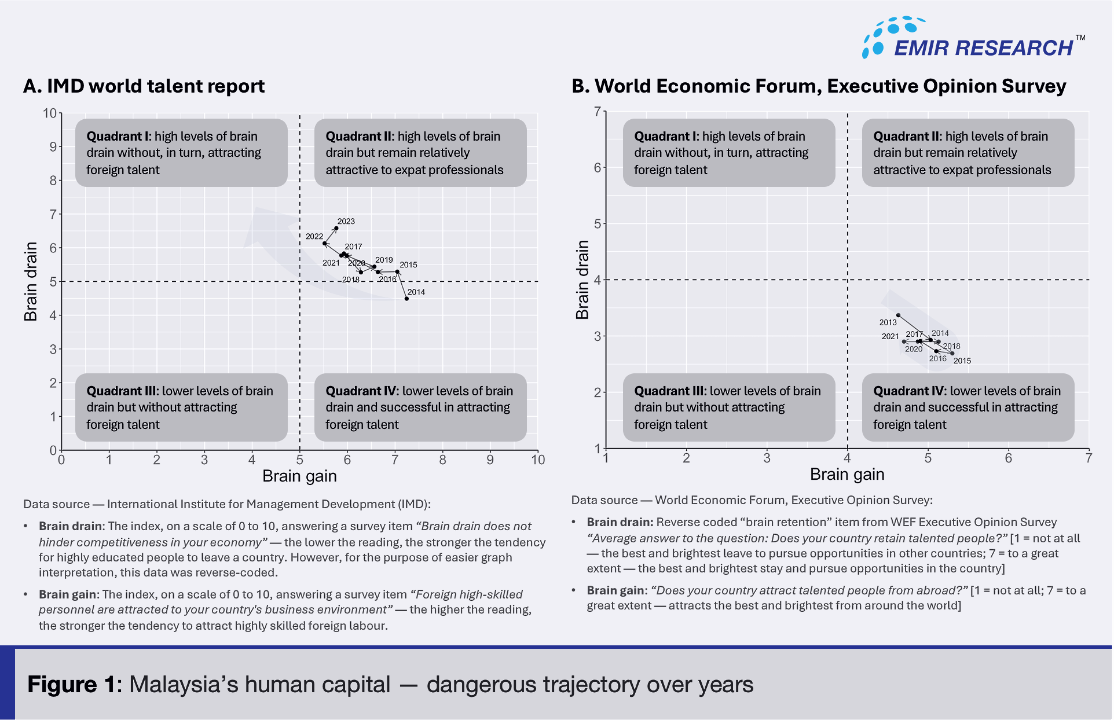
Lately, there has been a credible focus by the current Malaysian administration to look carefully into the issue of brain drain.
EMIR Research believes a credible intervention to stop, or at least slow down, the Malaysian brain drain is long overdue.
There is also hope that such an intervention this time around would be based on data-driven outputs (specific money spin-offs linked empirically to the desired outcomes and impacts) and therefore be able to tackle the very root causes of human flight effectively and efficiently with sensible outcomes and inter-generational impacts for the nation in place of cosmetic, very shallow policy efforts (refer to earlier EMIR Research suggestions on the matter in “How to make ‘brain gain’ programs work”).
Based on the data accumulated over decades by various research- and policy-making-related bodies, EMIR Research forewarned earlier that the Malaysian brain drain is reaching a dangerous growth rate and proportion for a nation (refer to “Malaysian brain drain – don’t go chasing waterfalls”) and profound negative impacts are being felt (refer to “Stop brain drain or lose lock, stock and barrel”).
According to the global brain drain indices, the Malaysian brain drain has slowed down during the COVID-19 pandemic, probably reflecting shrinking economic opportunities worldwide.
At that time, EMIR Research predicted (refer to “Brain drain or voting with the feet”) that we should expect the growing trend to resume forcefully due to a renewed zeal for digital transformation across industries once more developed economies recover and start filling up that significant capacity slack for human capital formed during the pandemic years.
Expectedly, the Human Flight and Brain Drain Index, calculated based on the hard as well as survey data, increased for Malaysia from 4.4 in 2022 to 7.5 in 2023, which is significantly higher than in the pre-pandemic year (5.10 index points) and also world average in 2023 (5.42 index points, based on 177 countries).
The global brain drain and brain gain indicators are also routinely accounted for under the “World Talent Ranking” report by the International Institute for Management Development (IMD), World Competitiveness Center.
Consistently with the Human Flight and Brain Drain Index, these global indices reveal how Malaysia’s brain drain has been taking a dangerous turn, moving into the zone where a country experiences high levels of brain drain without, in turn, attracting foreign talent (Figure 1A) suggesting that we can no longer dismiss it as a normal brain circulation.
The same sad dynamic is supported by data points from the Executive Opinion Survey by the World Economic Forum (Figure 1B).

So, we must face it – various global data points unanimously suggest that Malaysia is increasingly losing the lifeblood of innovation, competitiveness, and national progress.
For example, years of research observations led the IMD World Competitiveness Center to conclude that brain drain and brain gain are the key factors driving national competitiveness.
The years of research also helped the researchers to crystallize the critical pathways by the State to effectively mend brain drain and brain gain — legislation furthering and strengthening scientific development, openness (particularly to foreign highly-skilled labor) and political stability; assisting the private sector in embracing strategies that enhance enterprise adaptability to global market changes (4IR and soon 5IR), fostering an innovative culture; and strengthening the role of education (“What drives brain drain and brain gain?”).
This three-pronged strategy also broadly aligns with the EMIR Research findings based on a meta-analytical review of empirical research on brain drain pull and push factors in the Malaysian context (for details, refer to “Malaysian brain drain – don’t go chasing waterfalls”).
Therefore, to effectively address the brain drain challenge in Malaysia, policymakers should concurrently focus their efforts on the following key directions:
1. Legislation for setting up effective systems and mechanisms for curbing corruption at all levels (refer to “Pragmatically elbowing Malaysian corruption and leakages” for comprehensive framework suggestions by EMIR Research) is the top priority in plugging the Malaysian brain drain.
Only economies with strong institutions and effective coordination between need-based social policies and merit-based industrial policies can attract local and foreign talent.
A recent study (Li et al.) using advanced machine learning and data from 130 countries and a large pool of various variables revealed that corruption, not even other governance factors, is the primary driver of brain drain.
Furthermore, a careful look at Figure 1 reveals a slight reversal in the brain drain trajectory in 2018, likely due to Pakatan Harapan’s promises of improving institutions.
2. Promoting highly-skilled immigration is a more effective and economically beneficial strategy for addressing brain drain than attempting to re-attract the diaspora, as demonstrated by Harnoss using Malaysian data.
All highly developed countries put great emphasis on attracting skilled workers to boost innovation and productivity.
Experts predict that, like global currency and trade wars, “migration wars” for highly qualified young professionals will become a new reality. This is primarily due to the more pronounced ageing population in high-income developed nations.
According to World Bank estimates, the size of the global labor force as a percentage of population will remain remarkably stable over the next three decades, but the distribution of workers across labor markets may not always meet demand.
Therefore, there is a need to put forward a clear strategy for attracting foreign talent, including granting permanent residence or even citizenship, as well as access to education and other government services for qualified labor.
Rather than fearing job competition from foreign skilled labor, we should embrace their skills in creating new industries and expanding existing ones, increasing job opportunities for many Malaysians!
3. Investing in higher education is vital because strong Higher Education Institutions (HEIs) play a crucial role in attracting foreign talents and preventing local ones from leaving abroad for higher education, which makes it easier for them to settle abroad permanently.
However, strengthening HEIs is only one dimension of a direly needed broader national educational strategy (from kindergarten to tertiary).
Earlier, EMIR Research already emphasized the importance of closing the gaps between the Malaysian education system and global best practices/trends (refer to “Urgent need to reform Malaysian education system”).
4. Enhancing diaspora engagement and networking can be the primary focus of Talent Corporation Malaysia (TalentCorp).
First, collecting credible data about the Malaysian brain drain is needed to identify which specific industries and professional activities are most susceptible to brain drain, as these industries are most likely to represent the blanks in the fabric of the local ecosystem.
TalentCorp’s experience indicated only an abysmal number of expats returns. Nevertheless, international experience suggests that establishing strong networking with the expatriates can help in engaging them on a project basis as well as creating channels for foreign investment, stimulating trade and knowledge transfer.
5. Expanding the private sector and diversifying industries is crucial to mitigate brain drain and start attracting foreign talents.
In many middle- and upper-middle-income nations, the bulk of highly skilled professionals are employed by private enterprises. In the absence of job opportunities in the private sector, particularly in knowledge-intensive industries that yield productivity benefits, the emigration of highly skilled professionals will persist.
Empirical evidence indicates that the growing presence of government-linked companies (GLCs) in Malaysia’s economy is reducing private investment.
When GLCs dominate a large portion of the economy with their extensive ownership networks, it raises the risks of corruption, inefficiencies, and conflicts of interest, potentially favoring GLC monopolies over high-tech enterprises aligned with global advancements.
It is important to emphasize that addressing corruption is fundamental among the above key brain drain intervention strategies.
In a society with weak, corruption-prone institutions, even competitive salaries and incentives cannot attract bright foreign talent or the Malaysian diaspora. In such a scenario, investing in higher education merely feeds other countries.
Extractive political institutions entrench extractive economic systems, hindering private investment and high-skilled job creation and perpetuating the brain drain.
(Dr. Rais Hussin is the Founder of EMIR Research, a think tank focused on strategic policy recommendations based on rigorous research.)
ADVERTISEMENT
ADVERTISEMENT






































